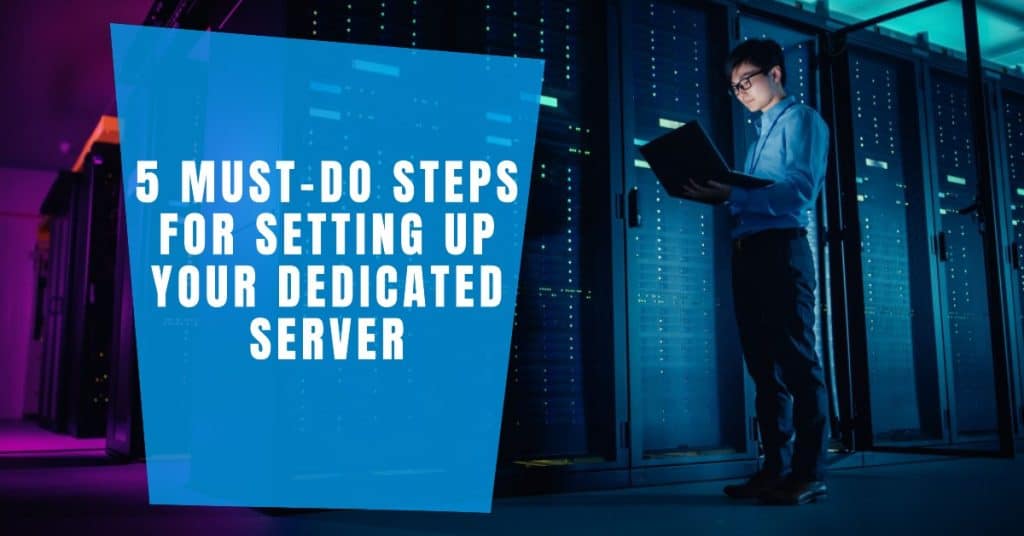
Dedicated server hosting utilizes the entire space on a server for a single client. Unlike VPS or shared hosting plans, dedicated hosting plans are meant to host only one client’s website. The major advantage of dedicated hosting is that you can get maximum speed and security without having to share your resources with other users.
5 Ways to Optimize Dedicated Server
So are there any steps that can be taken to improve an already awesome hosting plan? Yes, there are! Here are 5 ways you can optimize your dedicated server hosting environment. It is important to optimize your dedicated server for better performance, security and other aspects of hosting. If you are a business, then optimizing your dedicated server would be beneficial to you.

1. Use a Content Delivery Network
A content delivery network or CDN is primarily used to improve site loading time. It copies the content and distributes it across various locations. It also helps in reducing hosting costs, improving uptime and handling more traffic.
Content delivery networks improve user experience by reducing latency. When CDNs are placed strategically across the globe, they make it easier on the origin server when files are requested from areas that are geographically far from them.
CDN can reduce the cost of hosting by taking a significant amount of strain off the server. This means that frequent and expensive upgrades will not be required.
Since content is copied and made available on different servers, uptime will be significantly improved. In case one server goes down, other sources with the same content will be available. This will positively affect SEO as well.
A significant spike in traffic can be handled if a content delivery network is deployed. By distributing traffic across the network and taking it off the origin server, the load is reduced and requests can be attended to much more efficiently.
2. Secure Your Dedicated Server
Keeping the server secure should always be a number one priority. This is not just because a secure website keeps the data safe but also because secure servers improve performance.
For example, a security breach can lead to lowered uptime that negatively affects your business. The performance will also be negatively impacted if there is a breach of security. Frequent breaches would mean that the server crashes often.
You can improve security by enabling firewalls and intrusion detection systems. This will help in avoiding any malware from being installed on your server.
Prevent unauthorized access by implementing security measures such as encryption. Only allow necessary traffic such as web traffic, FTP, and email traffic to prevent unauthorized access to the server.
Steps to Secure a Dedicated Server
1. Update your Software Regularly
A common but serious mistake which most people make when it comes to the security of a dedicated server is ignoring the software update. An outdated software won’t have most or any of the latest security features, patches, and many other protection schemes. So, it is necessary to keep your software updated regularly, in order to keep your data safe from external threats.
2. Make use of a Firewall
Using a Firewall is an effective way of restricting external access, hence preventing external security breaches. At the most basic level, a firewall can filter out unwanted web traffic from a particular IP address or port. It actually acts as a protective barrier between your PC and the cyber world. Therefore, it is essential to choose a hosting provider that offers a superior quality firewall, which can prevent viruses, breaches, and other malicious data from entering your server.
3. Use a Strong Password
Using a Firewall is an effective way of restricting external access, hence preventing external security breaches. At the most basic level, a firewall can filter out unwanted web traffic from a particular IP address or port. It actually acts as a protective barrier between your PC and the cyber world. Therefore, it is essential to choose a hosting provider that offers a superior quality firewall, which can prevent viruses, breaches, and other malicious data from entering your server.
4. Backup Data Regularly
There is no means by which anyone can predict external attacks and breaches beforehand. This makes it necessary to keep a copy of the file or data in another location, in order to make sure that it is safe. Keeping a copy of the data can come in handy, in case you ever lose all your data.
3. Optimizing Database Queries
Query optimization reduces the time needed to respond to queries. By doing this, fewer resources need to be utilized to process these queries. This leads to less strain on the server, making it more efficient and easier to maintain.
Such optimization can help in managing the network between the server and the requestee, further improving the dedicated server environment.
You can optimize the database queries by identifying slow or inefficient queries and optimizing them to reduce the load on your database and improve response times.
Queries can be optimized by indexing. This method reduces the number of table scans necessary for data retrieval. Queries can also be rewritten to reduce the number of joins, subqueries and other operations that may be expensive.
Another method to optimize queries is data normalization. This method improves data consistency leading to faster query performance.
4. Update Your Dedicated Server OS Regularly
Regular updates help in improving the security of your server. Any vulnerability in the server can be addressed by such updates and prevent the risk of data loss. Performance is improved significantly with each update as it comes with bug fixes to optimize the server environment.
Regular updates ensure the compatibility of the server with the latest software. Apart from that, new features can be added for increased productivity and functionality. An ideal server is a stable server, and updating the server ensures more stability.
5. Performance Monitoring For Improved Server Environment
Performance monitoring can help in identifying problem areas. Identifying such issues make it easier to plan out a corrective action.
Monitoring resources can help to identify a performance bottleneck. Check the server’s CPU usage, memory, network traffic and other resources to make the performance of the server more efficient.
Analyzing performance metrics can help in planning for future server capacity requirements. It helps in predicting the resources needed for better performance over time.
With performance monitoring, one can easily identify codes that need optimization for better performance and make query responses faster.
You can track performance parameters using tools like Prometheus and Grafana. These tools give you a clear idea about the server performance and find areas of improvement.
Conclusion
Dedicated servers are an asset for large organizations or individuals who wish to have the ultimate and efficient performance for their servers.
To have the best performance from your server, there are many ways to optimize a dedicated server. This article discusses five ways to create an optimized dedicated server environment. The first method is to use a content delivery network. A CDN will help you achieve better loading time, reduce hosting cost, improved uptime and better traffic management.
The second method is by improving the security of your server. Dedicated servers are inherently more secure than other servers. Apart from keeping the data safe, the security of a server plays an important role in ensuring optimal performance.
Next, you can optimize the database queries. Doing so would reduce significantly the strain on a dedicated server. This improves the network between the server and the requestee.
Performance monitoring is another way to optimize the dedicated server. There are many advantages of performance monitoring such as predicting future resource requirements, optimizing codes and improving query response time.
Implement these tips and improve your experience with dedicated server hosting!
